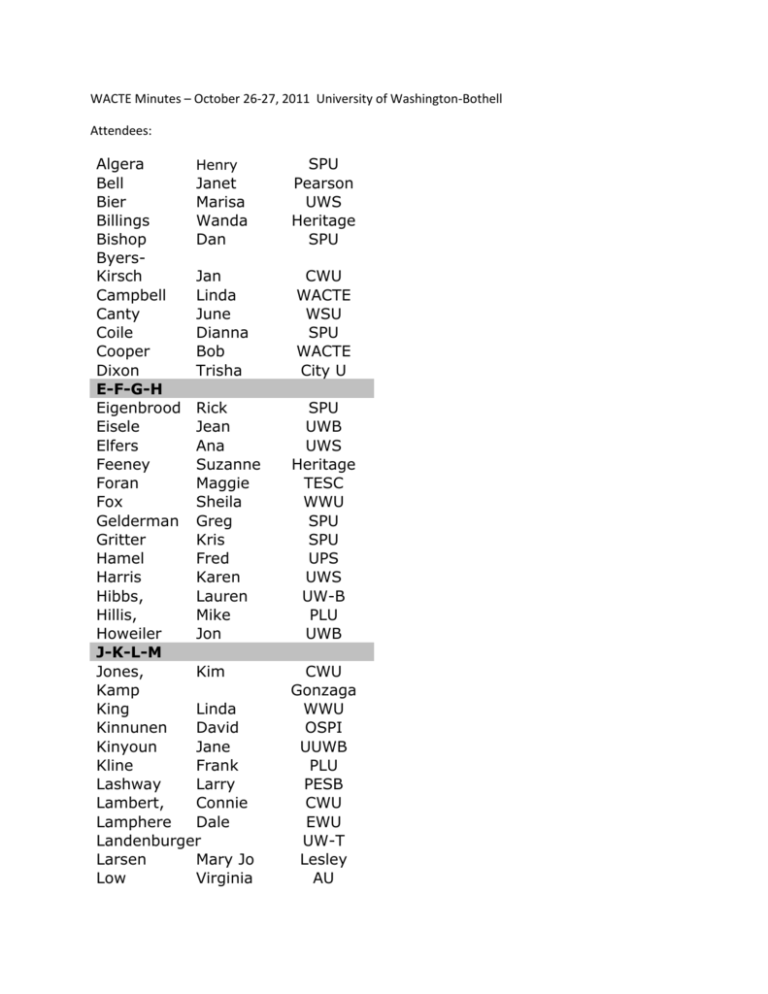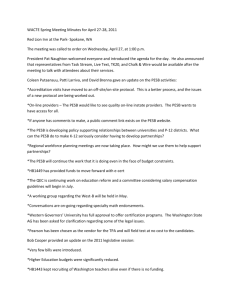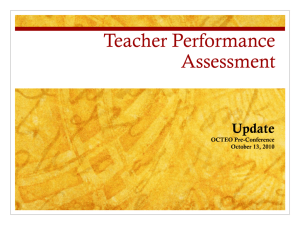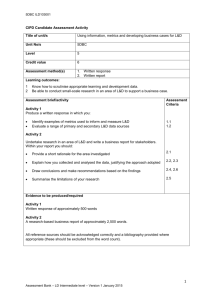October
advertisement

WACTE Minutes – October 26-27, 2011 University of Washington-Bothell Attendees: Algera Henry Bell Janet Bier Marisa Billings Wanda Bishop Dan ByersKirsch Jan Campbell Linda Canty June Coile Dianna Cooper Bob Dixon Trisha E-F-G-H Eigenbrood Rick Eisele Jean Elfers Ana Feeney Suzanne Foran Maggie Fox Sheila Gelderman Greg Gritter Kris Hamel Fred Harris Karen Hibbs, Lauren Hillis, Mike Howeiler Jon J-K-L-M Jones, Kim Kamp King Linda Kinnunen David Kinyoun Jane Kline Frank Lashway Larry Lambert, Connie Lamphere Dale Landenburger Larsen Mary Jo Low Virginia SPU Pearson UWS Heritage SPU CWU WACTE WSU SPU WACTE City U SPU UWB UWS Heritage TESC WWU SPU SPU UPS UWS UW-B PLU UWB CWU Gonzaga WWU OSPI UUWB PLU PESB CWU EWU UW-T Lesley AU McCleery McGuire Jennifer Margit Melgosa McGuire Mickel Mikel Muzzo N-P-R Naughton Newbiill Peck Portin Rios S-T Safstrom Schieber Schmitt Sexton Shinew Smart Smith Sodoroff Straub Sterner Sunderland Taylor Tiedeman Tucker V-W Valeo Vaughn Walker Wallace Westgard Whittacker Williams Woodward Julian Margit Kathlyn Ed Maria WWU SU WallaWalla U SU PLU AU UWS Pat Gary Cap Brad Francisco CU NWU UWS UWB WWU Bill Craig Sue Patrick Dawn Bob Steven Christine Sharon Dennis Jon Cathy Lynne Vanessa SPU CU SU UWS WSU Heritage City U Gonzaga Whitworth Gonzaga UWS PLU UW-T Chris Amy Mike Jennifer Joyce Andrea Faith Jon EWU SPU CU PESB St. Martin's Stanford EWU UPS The meeting was called to order by President Pat Naughton. A welcome to the campus was given by Bradley Portin, Director Teacher Education, University of Washington-Bothell Kenyon Chan, Chancellor of the University of Washington –Bothell welcomed the group and talked about how much he appreciated the work of the schools of education in training the teachers who train the students who come to the university. The new deans were introduced: Francisco Rios, Western Washington University; Bob Smart, Heritage University; Frank Klein, Pacific Lutheran University Ana Elfers from the University of Washington presented the assessment framework update. We need to use multiple forms of evidence to know better what we are doing thus using an evidence-based framework for assessment. We need a comprehensive approach to the collection and use of evidence for improvement of teacher education and teacher professional development. A continuous improvement model is needed that will respond to accountability. A sub-group of the assessment frameworks committee is focused on selection criteria and program features as they affect evidence collection. How might we account for individual program differences and yet have results that will be useful for program improvement? How do we collect evidence on recruitment and selection, partnerships (schools, districts, state agencies), teacher preparation programs, initial placement and induction and on-going development and how do we maintain an effective feedback loop? How do we create a coalition for collective responsibility with agencies and P-12 partners? Dennis Sterner spoke on the State and National Scan, Developing a Proactive Stance in the Current Political Environment. Our Future, Our Teachers: Defining high quality; linking scores to teachers and schools of education ESEA authorization: AYP for all but the lowest 5%; See Education Week October 16 issue; Teacher evaluation based in part on student performance; AACTE’s input: revise the definition of “highly qualified”; states should set measureable achievement and progress targets for special populations; local control; multiple measures for data; strengthen teacher and leader pathway in Title II; Defeat the Bennett amendment; improve literacy expectations in Title II Common Core: A shared set of clear standards in math and English; SMARTER Balanced Assessment Consortium (SBAC) working on new assessment system for K-12 Data, data, data New Standard V for teachers including sustainability, cultural competence, academic language Other: Alternative certification, residency programs, teacher competence and evaluation; online teacher education; education workforce development (ESDs); high need areas; STEM; achievement gap, changes in state approval, changes in national accreditation Funding New issues: NCTQ; Excellent Schools Now, new INTASC standards Additional issues: teacher recruitment and retention; common core standards and implications for Standard V, including revision of the West-E tests; unfunded mandates; school-based teacher preparation; co-curricular considerations; Excellent Schools Now; teacher –bashing; effective mentor teachers Jennifer Wallace gave a PESB update. She thanked the Schools of Education for their participation in the workforce development meetings. She spoke about how the Board members were working to meet the Board’s strategic demand and how to effectively gather data and then push it back? How do we deal with the accuracy of the data from the IHE’s? The PESB is working with Ana Elfers on these issues. Washington is a lead state in the TPA. All handbooks should be out by November 4th with all prompts and rubrics. Taskstream, Chalk & Wire, TK-20, and LiveText will load the templates. In the area of certification, Jennifer stated that certification funds support the PEABS and site visits. They are working on the timelines for the sending of fees. Twitter and Facebook are being used by the Board as a “look for” announcement tool. Pat Naughton and Linda Campbell led an activity allowing the participants to prioritize issues for the Executive Board to consider as priorities/goals for the 2011-12 year. Some listed include: A balance in the types of activities at the meetings; TPA and other hot button topics; lobbying strategies; the Interstate Compact; relationships with school districts: value-added concepts; possibility of a regional AACTE meeting Bob Cooper gave an update on the legislative agenda. On budget issues K-12 cannot be tapped much more, but IHEs and Health and Human Services can. The legislature has recognized Western Governors University, but no money will be given for support. Innovation Schools will be allowed, and there will be an elementary math specialty endorsement. There is a draft agenda for considering equivalents for the West-B requirement; proposals for alternative routes for principals, and changes in the Recruiting Washington Teachers Program; and, strengthening P-20 data systems to inform decision-making and early learning guidelines. Business meeting: The minutes were approved as written. The treasurer thanked the Schools of Education for 100% payment of the institutional dues. WACTE will be working on better budget tracking. The treasurer’s report was approved as given. Approval was given to expand the Executive Board with a second member-at-large, and thus to change the by-laws to reflect this change. Jessica Vavrus will be contacted to present to the January WACTE meeting regarding the Common Core as Schools of Education will have to retool to support candidates in their ability to teach the core competencies beginning in fall 2014. Thursday, October 27 Pat Naughton welcomed participants to the second day, and Bradley Portin added his welcome from the University of Washington-Bothell Andrea Whitaker from Stanford University congratulated the Washington State Schools of Education for leading the way on the TPA. The use of this assessment tool will provide evidence of effective teaching, support program improvement and inform policy. A key will be how we can gather and use the evidence from this assessment. The field test of the TPA will give a variety of perspectives. An analytic rubric will provide details about performance. The data can be used in both a formative and summative fashion to guide programmatic change. The focus will still need to be on all valued program outcomes. Attrition data must be carefully examined. In the field test will look at does the instrument technically work and does it give the information needed. They are testing the data-gathering process. They are building the program for the implementation year especially regarding the timing. They are looking at a three-week turn-around for the implementation, not the field test. It is important that all concerns be shared. Panel presentation and questions: Questions and answers from the Moderated Teacher Performance Assessment Policy Panel at the WACTE fall Conference; October 27, 2011 Members: Patrick Sexton, Larry Lashway, Margit McGuire, Janet, Bell, and Andrea Whitaker Q: Will we get scores back from the field test? A: Results by candidates will be given back to each institution Q: What is the timeline? A. We thought that was data-gathering, not consequential, but now we are adjusting. The deadline for submittal is May 15, and it will take 6 weeks to score. We are asking for how many submissions will be coming by the submission deadline. We are trying now to look at a rolling basis since we are finding that submission dates are all over the calendar. We are working on it. Q: What is the publication date for implementation handbooks? A: The goal of the field test is to get feedback for final implementation handbooks. Timeline is an issue. Will get a start on the handbooks, but consequential handbooks may not be out until September due to field test deadlines. Will need help in recruiting scorers if we are going to meet rolling deadlines. Scorers will be paid $75.00 per assessment and a small stipend for training. Q: Why do scorers need to be trained just two weeks prior to the assessment? A: Training needs to be recent, and is very important for calibration. There is no specific two week window. There will be a variety of training modules – all on line. Some training will be at the scorer’s convenience; other trainings will be in a webinar approach. Q: Will calibration end at some time and then begin again? A: Yes – There will be calibration exercises at various times. Q: How do we use feedback from the field test for fall? A: Results will not be back quickly enough to adjust fall plans. There are three elements on which universities can work: Academic language, assessment, and student voice Comment by Cap Peck: Studying work samples generates the best results for programs, even more than the quantitative data. Q: How are we going to use results for when the test becomes consequential? Comment: Whitworth is using the TPA like the PPA at this time as a part of the decision-making process. Q: When will scorers be recruited? A: The recruiting information will be up on the PESB website on November 1. We will also be doing an email blast. Q: Do we have the stipend amount? A: We have scoring assessment at $75.00. Stipend for training has not yet been set. Process for training will be different for the field test than for the operational testing. We will have the opportunity to give feedback. Larry Lashway and Patty Larriva are using their contacts to secure scorers, but are waiting to hear the scorer qualifications. WEA has also been engaged. Q: If we do not have students submit artifacts using the final interactive versions, what happens? A: The first six will be available by January so candidates will be able to submit these. They can cut and paste into the template. The others will be available later in January. Q: Will having students save in Livetext be sufficient? A: They should keep working there and then cut and paste from Livetext, Taskstream, etc. That is the goal so that that they don’t lose the data. Q: A $75.00 stipend is being offered for scoring as compared to $150.00 that people can earn as substitutes. Could we raise the stipend to engage quality scorers? A: $75.00 is for the field test. This might change for the operational version. If we raise the stipend, there may be consequences in costs to candidates. Comment: Patty Larriva stated that the PESB is thinking about offering clock hours for scoring. 10 clock hours for 4 assessments. Q: We are talking about 2 hours for scoring each document and then also training. Could universities pool their expertise? A: We think that will eventually happen. This will be up to Pearson to coordinate. However, the universities cannot abdicate responsibility for scoring. Everyone will need to contribute to fill the pool. Q: In thinking of the numbers and recruitment, and if we can’t come up with the numbers, who picks up the slack? What happens if we can’t recruit enough scorers? A: We could recruit from other institutions. It is our job to staff scoring sessions to make it happen. Q: If student voice is not a part of the national program, what are the ramifications? A: Scorers could take the “Washington module on student voice” training and be able to score even if they are not from Washington. We also hope to use principals-in-training and folks involved in induction programs. Q: Concern exists about the time of 2 hours to score. (It may take longer) How many should a scorer be expected to score? A: The 4-6 hours that we have been hearing to score a submission is unreasonable. With the templates, calibration, and rubrics, the model will make it more efficient. We will track the time in the field test. If you are going to take 2 days learning to score, you should score 4-6 portfolios. Comment: Cap Peck suggests that the institutions bring faculty together after training to talk about what they have learned and that this would be an incentive to score. Q: We thought about delaying the consequential aspect of the TPA, but then how do we pay for the field testing? So what were the decisions? A: Patty and Larry will cover what will be consequential and when. The field test will go to the TAC committee. They have already looked at the pilot. We will take this information then to the PESB, and the Board will discuss problematic areas. We want to make sure the students are taken care of. The Board could say that all areas are consequential or that certain areas will be consequential. The concern has been made very clear to the Board that the candidates need to be prepared. Q: Video permission forms? Are they going to be available in languages other than English? What about the role of the PESB in recruiting? A: Conversations have taken place with superintendent organizations and personnel directors about video-taping and receiving permission to use this. These groups are conducting a survey. From this feedback, we will create a uniform form. From there, we will create forms in several languages. We are working on making all video-taping inclusive in the permission form. We also need to communicate with the candidates about their appropriate use of the video-taping. We are working on an affidavit for candidates addressing this appropriate use. In addition, we will work on including the concept of using the videos for program evaluation purposes. Comment from Patrick Sexton: If you want a video-permission form addressing these areas, contact me. Q: What are we responsible for regarding documented needs for accommodations? A: Whatever is in the plan we need to address. Hard to anticipate the situations. We will rely on the institutions for support. We will deal with these on a case-by-case basis. The institution and the candidate should contact Pearson, and Pearson may also have to contact Stanford. Q: What about permission from the candidate for the use of their video-tapes for scorer training purposes? A: We will take that under consideration. Q: Considering that we won’t receive results until September, how do we help our candidates with their confusion? Can we use what we learn in spring? Will this be enough even though we will have more information by fall? A: We are implementing the operation versions in fall 2012, but these are not consequential until 2013. We have a whole process of standard-setting and benchmarking in summer 2012. We are trying to be responsive to the need for information as soon as possible so we are working on rolling deadlines so that we can give as much information back as early as possible on candidates, but we may not get the date analysis on the programs back to the institutions until August/September. Q: The question on the handbooks still exists. How do we use the feedback from the field test to improve the handbooks? A: We are hoping that there will not be a great deal of change, but we will not know until we look at the feedback. Q: Can we use what we have this spring (2011 handbooks) to use and score fall 2012? A: Yes. Q: Can we make changes from the field tests and still set standards or will we have to wait until the final documents? A: Will have to look. Many issues need to be decided before standard-setting. Q: Candidates are not paying fall 2012. What will happen if the scoring comes back to the institutions as this is a huge fiscal issue? A: No answer yet. Q: Should we be moving forward as quickly as we are in making this consequential for candidates? What is the consideration of timelines? A: If we don’t pay attention to these concerns and we trample on candidates, then we are remiss. Comment: Handbook delivery is not the same as candidate readiness. Q: Can we talk with our legislators about the timeline? A: These conversations are on-going. Bob Cooper shared the highlights of the Governor’s budget proposal for the special session: 15-20% cuts in Higher Ed; eliminate the state need grants; suspend the work study grants; delay the apportionment payments to K-12; eliminate the levy equalization; transfer bussing responsibility to the districts, increase class size by 2 in grades 4-12; reduce the school year by 5 days eliminate the National Board bonus; eliminate full day kindergarten. The next revenue forecast will be November 17. Cathy Taylor gave a presentation on student voice rubrics. Cathy Taylor also presented on academic language. Some resources are Jeff Zwiers, Anita Walqui, Tomasco Garrett, and Mary Ann Hundley in addition to GLAD training and Siop training. A question was posed as to the percentages of student voice and academic language rubrics in relationship to the entire TPA. Will this be studied? Also, with student voice being relatively new, will this be a validity issue? Attendees were reminded to send in contributions to the NING so that everyone will be able to share. The field test will be over spring 2012. Fall 2012 will see full implementation. For purpose of the field test, Washington has been allotted 3000 spots. If all of these are not used, the remaining slots will be rolled over to the fall. Thanks were given to Bradley Portin and his staff for their gracious hospitality. The next meeting will be January 18-19 at St. Martin’s.






